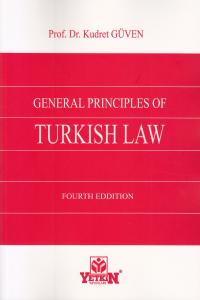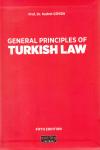
Prof. Dr. Kudret GÜVEN
The book contains of the main principles of Turkish private and public law; therefore, every reader will have a chance to fınd the elemantary knowledge in which they are especially interested. The newly developing branches of law, such as Environmental Law, has been taken in contex in or-der to give a general concept to the reader. The aim of the footnotes is to lead the reader to search the detailed information. Moreover, the lists of con-temporary decisions and the recent scientifıc publications shall guide the students in their professional careers.
Briefly, this book is designed to meet the demands of modem schools of the 2İst century about law, economy, fınance, public administration and business administration which emphasize the legal aspects of decision making.
(Önsöz'den)
İçindekiler
TABLE OF CONTENTS
PREFACE FOR THE FİRST EDİTİON VII
PREFACE FOR THE SECOND EDDİTİON VIII
PREFACE FOR THE THİRD EDDİTİON IX
PREFACE FOR THE FOURT EDDİTİON X
ABREVİATİONS XI
CONTENTS
CHAPTER I
IN GENERAL 1
§ I. The Contex and The Source of Law 1
§ 1. Introduction 1
§ 2. Sources of social order rules 4
1. Religious rules 4
2. Moral rules 5
3. Habits and Customs 5
4. Law 6
A. Constitutions 7
B. Codes 8
C. Ordinances (Decrees) 9
D. Regulations 10
E. By Laws 10
F. Unified Decisions of the Supreme Courts 11
5. Customary Law 12
A. Legal reference 12
B. Antiquity 13
C. Popular belief in the rightnes of a custom 13
D. Agreement with statutory law 13
6. Doctrine and juridical decision 14
§ 3. The Branches of Positive Law 14
1. Different Meanings of Law 14
2. The main Branches of Law 15
A. Benefit criterion 15
B. Freewill criterion 16
C. Sovereignty criterion 16
CHAPTER II
PRIVATE LAW 21
§. I. Civil Law 21
§ 1. General Provisions 21
1. Article 1 21
2. Article 2 22
3. Article 3 24
4. Article 4 24
5. Article 5 25
6. Article 6 26
7. Article 7 27
§ 2. Law of Persons 28
1. In General 28
2. Personality 28
A. Beginning of Personality 28
B. Termination of Personality 29
a. Absence 29
b. Death Presumption 30
3. Capacity 31
A. Capacity to be the subject of rights 31
a. Generality 31
b. Equality 31
c. Passivity 32
B. Capacity to act 32
a. Majority 32
b. Maturity 33
c. Negative condition: (Not to be interdicted) 33
C. Groups of Capacity to Act 33
a. Full Capacity 33
b. Full incapacity 34
c. Limited incapacity 34
aa. Tranactions of own power 34
bb. Transactions with the approval of their statutory representatives 34
cc. Prohibited Transactions 35
d. Limited Capacity 35
aa. Married woman 35
bb. Person bound to Statutory advisor 35
4. Legal Personality 36
A. Classification of Legal Persons 37
a. Types according to the scope of law to which
Legal Persons belong 37
aa. Public Legal persons 37
bb. Private Legal persons 37
cc. Legal persons Having Mixed Character 37
b. Classification due to the composition of
legal persons 38
B. Differences between real and Legal Persons 38
C. Protection of personality 39
§ 3. Family Law 42
1. In General 42
2. Filiation (nesep) 43
A. Natural Filiation 43
B. Artifical Filiation (unnatural Affinity) 45
3. Marriage 46
A. Conditions of valid marriage 46
B. Invalidity of marriage 47
C. Divorce 49
D. The Legal Consequences of Marriage and Divorce 51
E. The Representative Relations in Family Law 53
§ 4. Law of Succession 54
1. In General 54
2. General Principles of Law of Succession 54
A. Universal Succession 54
B. Parantel System 55
C. Testamentary Dispositions 56
D. Limits of freewill 57
3. The Conditions of being successor 58
§ 5 Law of Property 60
1. In General 60
2. The Concept of Property 62
3. Classification of property 63
A. Movable-immovable property 63
B. Res fungibles-infungibles 63
C. Property of consumption-inconsumption 63
D. Public-Private property 63
E. Res nullius-Property of proprietor 63
4. Real Rights 64
A. In General 64
a. Ownership 64
b. Limited Real Rights (Restricted Rights) 64
aa. Servitudes 64
aaa. Real Servitute (Easement) 64
bbb. Personal Servitude 65
ccc. lndependant and permenant rights 65
bb. Mortgage 65
cc. Right of incumbrance (Land charges) 66
B. Acquisition of Real Rights 66
a. Acquisition of Real Rights by the way of transfer
of title 66
b. Natural Acquisition 67
aa. Appropriation 68
bb. Founded property (CC.Art.769) 68
cc. Treasure (CC.Art.772) 68
dd. Conversion (CC.Art.775) 68
ee. Confusion and adhesion (CC.Art.776) 69
ff. Acquision of personal property by means of prescription (CC.Art.777) 69
gg. Occupation (CC.Art.707) 69
hh. Acquision of real property by means
of prescription (CC.Art.712, 713) 69
aaa. Ordinary prescription 69
bbb. Extraordinary prescription 70
C. Limitations of Real Rights 70
a. In General 70
b. Limitations determined by Civil Code 70
aa. Boundary servitudes 71
bb. Restrictions of the Power of Dispose 71
cc. Branches and roots of trees 72
dd. Free waters 72
ee. Limited real rights 72
D. The extent of the Real Rights 72
a. The vertical extent of ownership 73
b. The horizantal extent of ownership 73
E. Termination of Real Rights 74
a. Ownership 74
b. Limited real Rights 75
§ II. LAW OF OBLIGATIONS 76
§ 1. In General 76
§ 2. The Sources of Obligation 78
1. Legal Transactions 78
2. Contracts 80
A. Construction of Contract 81
B. Parties of a contract. 82
C. Plurality of the Parties 83
a. Plurality of deptors 83
b. Plurality of Creditors 83
D. Representation of the Contracting Parties 84
E. The Effect of Contracts 84
F. Content of Contracts 86
G. Transfer of Claims and Depts 88
H. The Termination of Contractual Depts 90
3. Classification of Contracts 92
4. Torts 94
A. In General 94
B. The Elements of Torts 95
5. Unjust Enrichment (Sebepsiz Zenginlesme) 98
A. Definition 98
B. The legal Elements of unjust Enrichment 98
C. The cases, which are out of the scope of unjust Enrichment 99
§ 3. Special Types of Contracts 99
1. Sale 99
2. Exchange 101
3. Suretyship 101
4. Deposit 103
5. Employment 104
6. Rent 104
§ III. COMMERCIAL LAW 113
§ 1. In General 113
§ 2. The Main Characteristics of Commercial Law 113
§ 3. Business Enterprise 115
1. In General 115
2. The Legal Consequences of Business Enterprises and Merchants 116
§ 4. Busines Associations (Companies) 118
1. In General 118
2. Classification of Companies 118
A. Personal Companies 118
a. Ordinary Partnership 119
b. Unlimited Companies 119
B. Capital Companies 120
a. Commandite company 120
b. Joint stock corporation 121
c. Limited Company 122
§ 5. Commercial Papers 122
§ 6. Maritime Law 124
1. In General 124
2. Ship 124
3. Shipowner (Donatan) 125
4. Seaman 125
5. Sea accidents 125
A. General average 125
B. Collision 126
a. Fortuitous collusion 126
b. Negligent collusion 126
§ 7. Insurance Law 126
1. In General 126
2. Life Insurance 127
3. Property insurance 127
A. In General 127
B. Legal Consequences of Property Insurance 128
§ IV. LITERARY RIGHTS 131
§ 1. In General 131
§ 2. The concept of mental and artistic Works 131
§ 3. Protection of Literary Rights 132
1. In General 132
2. Moral Rights 133
3. Monetary Rights 133
CHAPTER III
PUBLIC LAW (German: Offentliches Recht) 135
§ I. IN GENERAL. 135
§ II. THE ELEMENTS OF THE STATE 137
§ 1. Human Element 137
§ 2. Moral Element 137
§ 3. Territorial Element. 138
§ 4. Sovemignty 138
§ III. CONSTITUTIONAL LAW 139
§ 1. In General 139
§ 2. Turkish Constitutions 140
§ 3. The Legislature 145
1. In General 145
2. The Functions of Assembly 146
§ 4. The Executive 146
1. In General 146
2. The President of the Republic 146
A. Election and legal status of the President of the Republic 146
B. The Functions and the authority of President of the Republic 147
a. The Functions about Representation and Supervision 147
b. The Functions about Legislature 147
c. The Functions about Executive 147
d. The Functions about judiciary 148
3. The Council of Ministers 148
A. The Prime Minister 148
B. The Council of Ministers 148
§ 5. Judiciary 149
§ IV. ADMINISTRATIVE LAW 150
§ 1. In General 150
§ 2. The Main Principles of Turkish Administration System 151
1. State of Law 151
2. The Protection of Human Rights 152
3. Social State 152
4. Secularism 153
5. Democratic State 153
6. Statism (Etatism) 153
7. National State 154
8. Superiority of administration 154
§ 3. Administrative actions and transactions 154
1. In General 154
2. The Constructive elements of Administrative acts 155
A. Cause 155
B. Authority 156
C. Form 156
D. Subject 156
E. Intention 156
§ 4. The invalidity of administrative acts 157
1. Nonexistence 157
2. Annulment 157
3. Defects, which do not cause invalidity 157
§ 5. Judicial supervision of Administration 158
1. Action for annulment 158
2. Full remedy action 158
3. Criminal action 159
4. Action of interpretation 159
§ 6. The Administrative organizations 160
1. Central Administration 160
A. Central departments (The Ministries) 160
B. Provincial departments 161
2. Local Administration 161
A. Province private administration 161
B. Municipalities 161
C. Village administration 161
3. Other Public İnstutions 162
§ 7. Public Possessions 162
1. National domain 162
2. Private Property of the State 164
§ V. INTERNATiONAL PUBLIC LAW 167
§ 1. In General 167
§ 2. Sources of International Law 168
1. In General 168
2. Main formal sources 168
A. Unwritten sources (Customs=usage) 168
B. Written sources (International agreements) Pacts 169
§ 3. International Organisations 169
1. In General 169
2. International Organisations in historical aspect. 170
§ 4. The sanctions of international organisations 172
§ VI. CRIMINAL LAW 176
§ 1. In General 176
1. Classical school 177
A. Absolute justice theory 177
B. Social benefit theory 177
C. Compound theory 177
2. Positivist school 177
3. Contemporary theories 178
§ 2. Crime 178
1. In General 178
2. The elements of a crime 179
A. The legal element 179
B. The material element 181
a. Positive elements 181
b. Negative elements 182
c. Moral element of crime 182
a. Intent 182
b. Negligence 183
3. Participation in a crime 183
4. Categories of crimes 184
A. Crimes against the state 184
B. Crimes against society. 185
C. Crimes against public order 185
D. Crimes against public safety 185
E. Crimes against public decency and family order. 185
F. Crimes against persons 185
G. Crimes against property 185
§ 3. The Punishments 185
A. Capital punishment 186
B. Heavy imprisonment 186
C. Imprisonment 186
D. Heavy Fine 186
E. Disqualification from public service 186
§ 4. The Legal Consequences of Punishments 186
CHAPTER IV
LAW BRANHES OF ITS OWN KIND (SUI GENERIS LAWS) 191
§ I. IN GENERAL 191
§ II. INTERNATIONAL PRIVATE LAW 192
§ 1. In General 192
§ 2. General Principles of Turkish International Private Law 193
1. Locus Regit Actum 193
2. Lex Loci Delicti Commissi 193
3. National Law 193
4. Lex Rei Sitae 194
5. Lex Fori 194
§ 3. Nationality 194
1. Acquisiton of nationality 195
A. Acquisition by the order of Law 195
a. Nationality by birth 195
b. Nationality by territorral grounds 195
c. Nationality by marriage 196
B. Acguision By the order of Public Authority 196
a. Ordinary Naturalisation 196
b. Extraordinary Naturalisation 197
c. Re-Naturalisation 197
d. Right of Selection 198
2. The Consequences of Acquisition of Nationality 198
A. In Marriage 198
B. In Naturalisation 198
C. In Right of Selection 199
§ 4. Termination of nationality rights 199
A. Leaving the nationality 199
B. The nullification of naturalisation 200
C. Loss of Nationality because of actions contrary to the
Fidelity Against the State 200
D. Loss of Nationality by the Right of Selection 201
§ 5. The Consequences of Loss of Turkish Nationality 202
§ 6. Rights of Citizenship 202
A. Habitation 202
B. The Acguisition of Property Rights 203
C. Right to Work 203
§ III. LAND LAW (AGRARIAN LAW) 206
§ 1. Definitions and Subject of the Law of Land 206
§ 2. The Histroy of Land Law 207
1. The Concept of Land in islamic Law 207
A. Dominion lands 207
B. Anti dominion lands 207
2. Period of Otoman Empire 208
A. Before the Land Code of 1858 208
B. After the Land Code of 1 858 209
§ 3. Land and Agriculture Reform 209
1. In General 209
2. Reform Practice 210
§ 4. Cadastre Affairs in Turkey 211
1. In General 211
2. The Pirnciples of fixation the ownership. 212
A. Real property registered in the land registry 212
B. Unregistered real property 212
C. İmproved and reclaimed real property 213
§ IV. LABOR LAW 215
§ 1. In General 215
§ 2. The main principles and opinions in Labor Law 216
§ 3. The individual Labor Law 218
1. In General 218
2. Contract of employment 218
3. The obligations and duties of Employer 219
4. The obligations and duties of Employee 220
5. Termination of Labor Contract. 220
6. Legal conequences of rescission 223
§ 4. The collective Labor Law 223
1. In General 223
2. Syndical Freedom and Rights 224
3. The Functions of Labor Unions 224
§ V. LAW OF PROCEDURE 229
§ 1. In General 229
§ 2. Common Principles of Law of Procedure 229
1. The Court Structure in Civil and Criminal Procedure 229
2. The Burden of Proof 230
3. Means of Proof 230
4. Challenging of judges and Retirement 230
5. Inter three-party system 231
6. Ex-official examination 231
§ 3. Main Differences Between Law of Civil and Criminal Procedure 232
§ 4. Jurisdiction of the cause (Competence) 234
1. Competence of the Civil Courts 234
2. Competence of Criminal Courts 235
§ 5. Territorial jurisdiction (Venue) 235
1. Venue of the Civil courts 235
2. Venue of the Criminal courts 236
§ 6. Arbitration 237
§ VI. TAX LAW 239
§ 1. In General 239
§ 2. The General Principles of Tax Law 240
1. Principle of Legality of Taxes 240
2. Equality before tax codes 240
3. Duties and negative obligations 240
§ 3. The Parties of Tax relation 241
1. Creditor of tax 241
2. Deptor of tax 241
a. Qualifications of Taxability 241
b. Tax obligator 241
§ 4. The subject-matter of Tax (Tax object) 242
1. lncome 242
2. Expenses 242
3. Weath and change of possession in wealth 242
§ 5. Tax exempts and tax exceptions 242
§ 6. Basis of Tax (Taxable value) 243
1. Declaration system 243
2. Presumption system 243
3. Administrative discretion system 243
4. Lump sum system (Bulk system) 243
§ 7. Termination of tax obligation 244
1. Prescription 244
2. Cancellation of tax 244
§ VII. ENVIRONMENTAL LAW 246
§ 1. In General 246
§ 2. The Qualifications of Environmental Law 247
§ 3. Legal Sources of Environmental Right 249
1. Constitutional regulations 249
2. Environmental Legislation 250
§ 4. Penal and Administrative measures 251
1. Penal sanctions 251
2. Administrative protection 252
§ 5. Civil Sanctions 253
§ 6. The Right of Resort 254
ALPHABETICAL LEGAL TERMS 257
Prof. Dr. Kudret GÜVEN
The book contains of the main principles of Turkish private and public law; therefore, every reader will have a chance to fınd the elemantary knowledge in which they are especially interested. The newly developing branches of law, such as Environmental Law, has been taken in contex in or-der to give a general concept to the reader. The aim of the footnotes is to lead the reader to search the detailed information. Moreover, the lists of con-temporary decisions and the recent scientifıc publications shall guide the students in their professional careers.
Briefly, this book is designed to meet the demands of modem schools of the 2İst century about law, economy, fınance, public administration and business administration which emphasize the legal aspects of decision making.
(Önsöz'den)
İçindekiler
TABLE OF CONTENTS
PREFACE FOR THE FİRST EDİTİON VII
PREFACE FOR THE SECOND EDDİTİON VIII
PREFACE FOR THE THİRD EDDİTİON IX
PREFACE FOR THE FOURT EDDİTİON X
ABREVİATİONS XI
CONTENTS
CHAPTER I
IN GENERAL 1
§ I. The Contex and The Source of Law 1
§ 1. Introduction 1
§ 2. Sources of social order rules 4
1. Religious rules 4
2. Moral rules 5
3. Habits and Customs 5
4. Law 6
A. Constitutions 7
B. Codes 8
C. Ordinances (Decrees) 9
D. Regulations 10
E. By Laws 10
F. Unified Decisions of the Supreme Courts 11
5. Customary Law 12
A. Legal reference 12
B. Antiquity 13
C. Popular belief in the rightnes of a custom 13
D. Agreement with statutory law 13
6. Doctrine and juridical decision 14
§ 3. The Branches of Positive Law 14
1. Different Meanings of Law 14
2. The main Branches of Law 15
A. Benefit criterion 15
B. Freewill criterion 16
C. Sovereignty criterion 16
CHAPTER II
PRIVATE LAW 21
§. I. Civil Law 21
§ 1. General Provisions 21
1. Article 1 21
2. Article 2 22
3. Article 3 24
4. Article 4 24
5. Article 5 25
6. Article 6 26
7. Article 7 27
§ 2. Law of Persons 28
1. In General 28
2. Personality 28
A. Beginning of Personality 28
B. Termination of Personality 29
a. Absence 29
b. Death Presumption 30
3. Capacity 31
A. Capacity to be the subject of rights 31
a. Generality 31
b. Equality 31
c. Passivity 32
B. Capacity to act 32
a. Majority 32
b. Maturity 33
c. Negative condition: (Not to be interdicted) 33
C. Groups of Capacity to Act 33
a. Full Capacity 33
b. Full incapacity 34
c. Limited incapacity 34
aa. Tranactions of own power 34
bb. Transactions with the approval of their statutory representatives 34
cc. Prohibited Transactions 35
d. Limited Capacity 35
aa. Married woman 35
bb. Person bound to Statutory advisor 35
4. Legal Personality 36
A. Classification of Legal Persons 37
a. Types according to the scope of law to which
Legal Persons belong 37
aa. Public Legal persons 37
bb. Private Legal persons 37
cc. Legal persons Having Mixed Character 37
b. Classification due to the composition of
legal persons 38
B. Differences between real and Legal Persons 38
C. Protection of personality 39
§ 3. Family Law 42
1. In General 42
2. Filiation (nesep) 43
A. Natural Filiation 43
B. Artifical Filiation (unnatural Affinity) 45
3. Marriage 46
A. Conditions of valid marriage 46
B. Invalidity of marriage 47
C. Divorce 49
D. The Legal Consequences of Marriage and Divorce 51
E. The Representative Relations in Family Law 53
§ 4. Law of Succession 54
1. In General 54
2. General Principles of Law of Succession 54
A. Universal Succession 54
B. Parantel System 55
C. Testamentary Dispositions 56
D. Limits of freewill 57
3. The Conditions of being successor 58
§ 5 Law of Property 60
1. In General 60
2. The Concept of Property 62
3. Classification of property 63
A. Movable-immovable property 63
B. Res fungibles-infungibles 63
C. Property of consumption-inconsumption 63
D. Public-Private property 63
E. Res nullius-Property of proprietor 63
4. Real Rights 64
A. In General 64
a. Ownership 64
b. Limited Real Rights (Restricted Rights) 64
aa. Servitudes 64
aaa. Real Servitute (Easement) 64
bbb. Personal Servitude 65
ccc. lndependant and permenant rights 65
bb. Mortgage 65
cc. Right of incumbrance (Land charges) 66
B. Acquisition of Real Rights 66
a. Acquisition of Real Rights by the way of transfer
of title 66
b. Natural Acquisition 67
aa. Appropriation 68
bb. Founded property (CC.Art.769) 68
cc. Treasure (CC.Art.772) 68
dd. Conversion (CC.Art.775) 68
ee. Confusion and adhesion (CC.Art.776) 69
ff. Acquision of personal property by means of prescription (CC.Art.777) 69
gg. Occupation (CC.Art.707) 69
hh. Acquision of real property by means
of prescription (CC.Art.712, 713) 69
aaa. Ordinary prescription 69
bbb. Extraordinary prescription 70
C. Limitations of Real Rights 70
a. In General 70
b. Limitations determined by Civil Code 70
aa. Boundary servitudes 71
bb. Restrictions of the Power of Dispose 71
cc. Branches and roots of trees 72
dd. Free waters 72
ee. Limited real rights 72
D. The extent of the Real Rights 72
a. The vertical extent of ownership 73
b. The horizantal extent of ownership 73
E. Termination of Real Rights 74
a. Ownership 74
b. Limited real Rights 75
§ II. LAW OF OBLIGATIONS 76
§ 1. In General 76
§ 2. The Sources of Obligation 78
1. Legal Transactions 78
2. Contracts 80
A. Construction of Contract 81
B. Parties of a contract. 82
C. Plurality of the Parties 83
a. Plurality of deptors 83
b. Plurality of Creditors 83
D. Representation of the Contracting Parties 84
E. The Effect of Contracts 84
F. Content of Contracts 86
G. Transfer of Claims and Depts 88
H. The Termination of Contractual Depts 90
3. Classification of Contracts 92
4. Torts 94
A. In General 94
B. The Elements of Torts 95
5. Unjust Enrichment (Sebepsiz Zenginlesme) 98
A. Definition 98
B. The legal Elements of unjust Enrichment 98
C. The cases, which are out of the scope of unjust Enrichment 99
§ 3. Special Types of Contracts 99
1. Sale 99
2. Exchange 101
3. Suretyship 101
4. Deposit 103
5. Employment 104
6. Rent 104
§ III. COMMERCIAL LAW 113
§ 1. In General 113
§ 2. The Main Characteristics of Commercial Law 113
§ 3. Business Enterprise 115
1. In General 115
2. The Legal Consequences of Business Enterprises and Merchants 116
§ 4. Busines Associations (Companies) 118
1. In General 118
2. Classification of Companies 118
A. Personal Companies 118
a. Ordinary Partnership 119
b. Unlimited Companies 119
B. Capital Companies 120
a. Commandite company 120
b. Joint stock corporation 121
c. Limited Company 122
§ 5. Commercial Papers 122
§ 6. Maritime Law 124
1. In General 124
2. Ship 124
3. Shipowner (Donatan) 125
4. Seaman 125
5. Sea accidents 125
A. General average 125
B. Collision 126
a. Fortuitous collusion 126
b. Negligent collusion 126
§ 7. Insurance Law 126
1. In General 126
2. Life Insurance 127
3. Property insurance 127
A. In General 127
B. Legal Consequences of Property Insurance 128
§ IV. LITERARY RIGHTS 131
§ 1. In General 131
§ 2. The concept of mental and artistic Works 131
§ 3. Protection of Literary Rights 132
1. In General 132
2. Moral Rights 133
3. Monetary Rights 133
CHAPTER III
PUBLIC LAW (German: Offentliches Recht) 135
§ I. IN GENERAL. 135
§ II. THE ELEMENTS OF THE STATE 137
§ 1. Human Element 137
§ 2. Moral Element 137
§ 3. Territorial Element. 138
§ 4. Sovemignty 138
§ III. CONSTITUTIONAL LAW 139
§ 1. In General 139
§ 2. Turkish Constitutions 140
§ 3. The Legislature 145
1. In General 145
2. The Functions of Assembly 146
§ 4. The Executive 146
1. In General 146
2. The President of the Republic 146
A. Election and legal status of the President of the Republic 146
B. The Functions and the authority of President of the Republic 147
a. The Functions about Representation and Supervision 147
b. The Functions about Legislature 147
c. The Functions about Executive 147
d. The Functions about judiciary 148
3. The Council of Ministers 148
A. The Prime Minister 148
B. The Council of Ministers 148
§ 5. Judiciary 149
§ IV. ADMINISTRATIVE LAW 150
§ 1. In General 150
§ 2. The Main Principles of Turkish Administration System 151
1. State of Law 151
2. The Protection of Human Rights 152
3. Social State 152
4. Secularism 153
5. Democratic State 153
6. Statism (Etatism) 153
7. National State 154
8. Superiority of administration 154
§ 3. Administrative actions and transactions 154
1. In General 154
2. The Constructive elements of Administrative acts 155
A. Cause 155
B. Authority 156
C. Form 156
D. Subject 156
E. Intention 156
§ 4. The invalidity of administrative acts 157
1. Nonexistence 157
2. Annulment 157
3. Defects, which do not cause invalidity 157
§ 5. Judicial supervision of Administration 158
1. Action for annulment 158
2. Full remedy action 158
3. Criminal action 159
4. Action of interpretation 159
§ 6. The Administrative organizations 160
1. Central Administration 160
A. Central departments (The Ministries) 160
B. Provincial departments 161
2. Local Administration 161
A. Province private administration 161
B. Municipalities 161
C. Village administration 161
3. Other Public İnstutions 162
§ 7. Public Possessions 162
1. National domain 162
2. Private Property of the State 164
§ V. INTERNATiONAL PUBLIC LAW 167
§ 1. In General 167
§ 2. Sources of International Law 168
1. In General 168
2. Main formal sources 168
A. Unwritten sources (Customs=usage) 168
B. Written sources (International agreements) Pacts 169
§ 3. International Organisations 169
1. In General 169
2. International Organisations in historical aspect. 170
§ 4. The sanctions of international organisations 172
§ VI. CRIMINAL LAW 176
§ 1. In General 176
1. Classical school 177
A. Absolute justice theory 177
B. Social benefit theory 177
C. Compound theory 177
2. Positivist school 177
3. Contemporary theories 178
§ 2. Crime 178
1. In General 178
2. The elements of a crime 179
A. The legal element 179
B. The material element 181
a. Positive elements 181
b. Negative elements 182
c. Moral element of crime 182
a. Intent 182
b. Negligence 183
3. Participation in a crime 183
4. Categories of crimes 184
A. Crimes against the state 184
B. Crimes against society. 185
C. Crimes against public order 185
D. Crimes against public safety 185
E. Crimes against public decency and family order. 185
F. Crimes against persons 185
G. Crimes against property 185
§ 3. The Punishments 185
A. Capital punishment 186
B. Heavy imprisonment 186
C. Imprisonment 186
D. Heavy Fine 186
E. Disqualification from public service 186
§ 4. The Legal Consequences of Punishments 186
CHAPTER IV
LAW BRANHES OF ITS OWN KIND (SUI GENERIS LAWS) 191
§ I. IN GENERAL 191
§ II. INTERNATIONAL PRIVATE LAW 192
§ 1. In General 192
§ 2. General Principles of Turkish International Private Law 193
1. Locus Regit Actum 193
2. Lex Loci Delicti Commissi 193
3. National Law 193
4. Lex Rei Sitae 194
5. Lex Fori 194
§ 3. Nationality 194
1. Acquisiton of nationality 195
A. Acquisition by the order of Law 195
a. Nationality by birth 195
b. Nationality by territorral grounds 195
c. Nationality by marriage 196
B. Acguision By the order of Public Authority 196
a. Ordinary Naturalisation 196
b. Extraordinary Naturalisation 197
c. Re-Naturalisation 197
d. Right of Selection 198
2. The Consequences of Acquisition of Nationality 198
A. In Marriage 198
B. In Naturalisation 198
C. In Right of Selection 199
§ 4. Termination of nationality rights 199
A. Leaving the nationality 199
B. The nullification of naturalisation 200
C. Loss of Nationality because of actions contrary to the
Fidelity Against the State 200
D. Loss of Nationality by the Right of Selection 201
§ 5. The Consequences of Loss of Turkish Nationality 202
§ 6. Rights of Citizenship 202
A. Habitation 202
B. The Acguisition of Property Rights 203
C. Right to Work 203
§ III. LAND LAW (AGRARIAN LAW) 206
§ 1. Definitions and Subject of the Law of Land 206
§ 2. The Histroy of Land Law 207
1. The Concept of Land in islamic Law 207
A. Dominion lands 207
B. Anti dominion lands 207
2. Period of Otoman Empire 208
A. Before the Land Code of 1858 208
B. After the Land Code of 1 858 209
§ 3. Land and Agriculture Reform 209
1. In General 209
2. Reform Practice 210
§ 4. Cadastre Affairs in Turkey 211
1. In General 211
2. The Pirnciples of fixation the ownership. 212
A. Real property registered in the land registry 212
B. Unregistered real property 212
C. İmproved and reclaimed real property 213
§ IV. LABOR LAW 215
§ 1. In General 215
§ 2. The main principles and opinions in Labor Law 216
§ 3. The individual Labor Law 218
1. In General 218
2. Contract of employment 218
3. The obligations and duties of Employer 219
4. The obligations and duties of Employee 220
5. Termination of Labor Contract. 220
6. Legal conequences of rescission 223
§ 4. The collective Labor Law 223
1. In General 223
2. Syndical Freedom and Rights 224
3. The Functions of Labor Unions 224
§ V. LAW OF PROCEDURE 229
§ 1. In General 229
§ 2. Common Principles of Law of Procedure 229
1. The Court Structure in Civil and Criminal Procedure 229
2. The Burden of Proof 230
3. Means of Proof 230
4. Challenging of judges and Retirement 230
5. Inter three-party system 231
6. Ex-official examination 231
§ 3. Main Differences Between Law of Civil and Criminal Procedure 232
§ 4. Jurisdiction of the cause (Competence) 234
1. Competence of the Civil Courts 234
2. Competence of Criminal Courts 235
§ 5. Territorial jurisdiction (Venue) 235
1. Venue of the Civil courts 235
2. Venue of the Criminal courts 236
§ 6. Arbitration 237
§ VI. TAX LAW 239
§ 1. In General 239
§ 2. The General Principles of Tax Law 240
1. Principle of Legality of Taxes 240
2. Equality before tax codes 240
3. Duties and negative obligations 240
§ 3. The Parties of Tax relation 241
1. Creditor of tax 241
2. Deptor of tax 241
a. Qualifications of Taxability 241
b. Tax obligator 241
§ 4. The subject-matter of Tax (Tax object) 242
1. lncome 242
2. Expenses 242
3. Weath and change of possession in wealth 242
§ 5. Tax exempts and tax exceptions 242
§ 6. Basis of Tax (Taxable value) 243
1. Declaration system 243
2. Presumption system 243
3. Administrative discretion system 243
4. Lump sum system (Bulk system) 243
§ 7. Termination of tax obligation 244
1. Prescription 244
2. Cancellation of tax 244
§ VII. ENVIRONMENTAL LAW 246
§ 1. In General 246
§ 2. The Qualifications of Environmental Law 247
§ 3. Legal Sources of Environmental Right 249
1. Constitutional regulations 249
2. Environmental Legislation 250
§ 4. Penal and Administrative measures 251
1. Penal sanctions 251
2. Administrative protection 252
§ 5. Civil Sanctions 253
§ 6. The Right of Resort 254
ALPHABETICAL LEGAL TERMS 257










